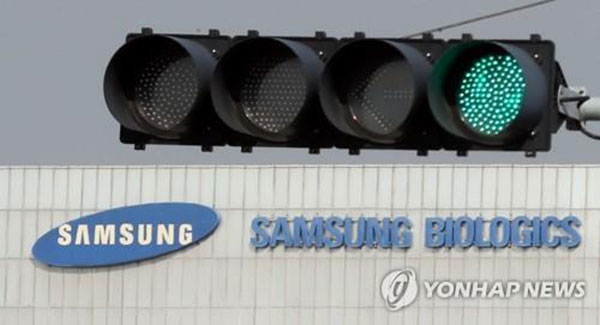South Korea's bourse operator on Dec. 10, 2018 decided that Samsung BioLogics Co. is qualified to continue to be listed on the local stock market despite being cited for accounting fraud.
The Corporate Review Committee under the Korea Exchange (KRX) made the ruling, paving the way for its share to be traded again on the KOSPI starting on Dec. 11, 2018.

Trading had been suspended since November 14, as the country's financial regulator, the Financial Services Commission (FSC), ruled that Samsung BioLogics intentionally violated accounting rules ahead of its initial public offering in 2016.
"Despite some shortcomings regarding its managerial transparency, (the committee) decided to maintain its listing, factoring in corporate sustainability and financial stability," the KRX said in a release.
The six-member committee, comprised mostly of outside experts, including a lawyer, a professor and an accountant, held their first review session from 2 p.m. on Dec. 10, 2018 and made the decision much earlier than expected, according to market watchers, as the deadline for the decision on whether or not to allow trading had been set for Dec. 31.
In the worst-case scenario, Samsung BioLogics could have been removed from the stock market. Or it could have been allowed back on the trading floor after a probation period.
"The decision is expected to help erase uncertainties on the market," a KRX official said, requesting anonymity.
Since 2009 when the bourse operator introduced the delisting validity rules, 17 KOSPI firms, including Samsung BioLogics, have been reviewed over accounting mishaps, but none has ever been eliminated.
Samsung BioLogics welcomed the decision, saying the swift decision "will protect investors," while vowing to "improve corporate transparency and strive to contribute to the development of the Korean capital market."
Noting that the biotech firm presented a plan aiming at improving its auditing functions and internal accounting management system, the KRX said it will "closely check its implementation over the next three years."
The regulatory review centers on questions about the loss-making Samsung BioLogics' reporting of sudden profits in 2015 after changing the method of calculating the value of Samsung Bioepis, which is a joint venture with the U.S.-based Biogen Inc.
The alleged irregularities helped boost the value of Cheil Industries and benefited Samsung Group's heir apparent, Lee Jae-yong, as Cheil Industries held a 46.3 percent stake in Samsung BioLogics and Lee was a major stakeholder in Cheil Industries at that time, according to some ruling party lawmakers and civic groups.
The merger of the two Samsung units was widely seen as a step to enhance Lee's control of Samsung Group, as his father Lee Kun-hee suffered a heart attack in 2014 and has been hospitalized ever since.
Following the FSC's ruling in November, the case was sent to the state prosecutor's office, while the company has denied any wrongdoing, claiming that the change in accounting methods was in line with international accounting standards, and vowed to take legal action against the ruling.
As of Nov. 14, the shares of Samsung BioLogics finished at 334,500 won (US$296.54), and its total capitalization on the KOSPI market stands at 22.13 trillion won. (Yonhap)

